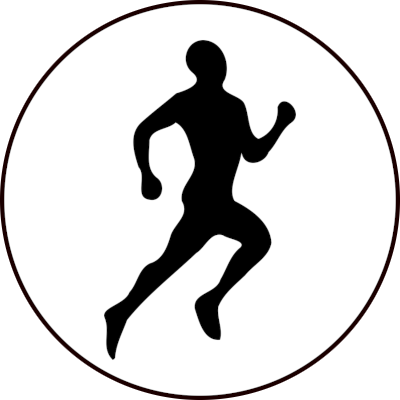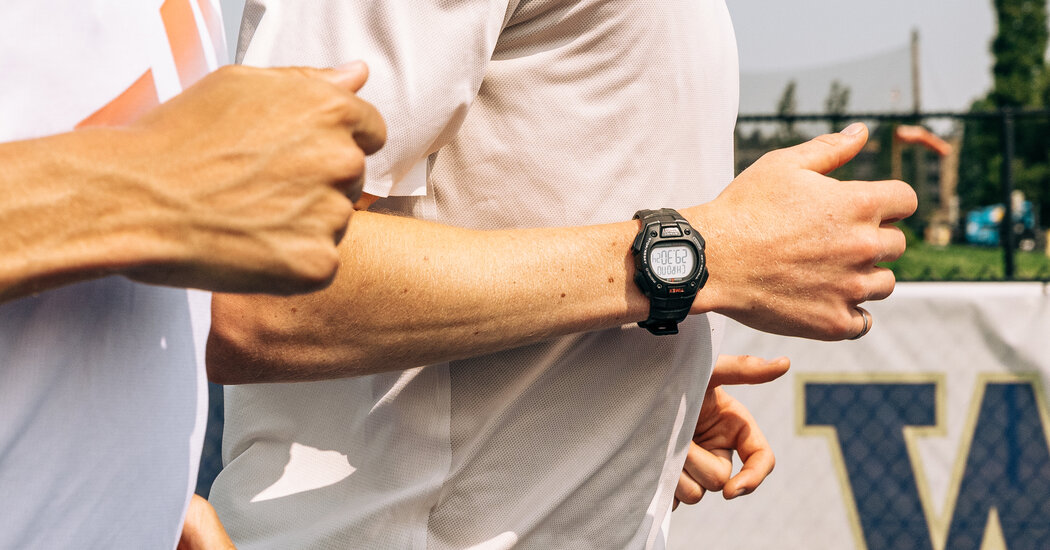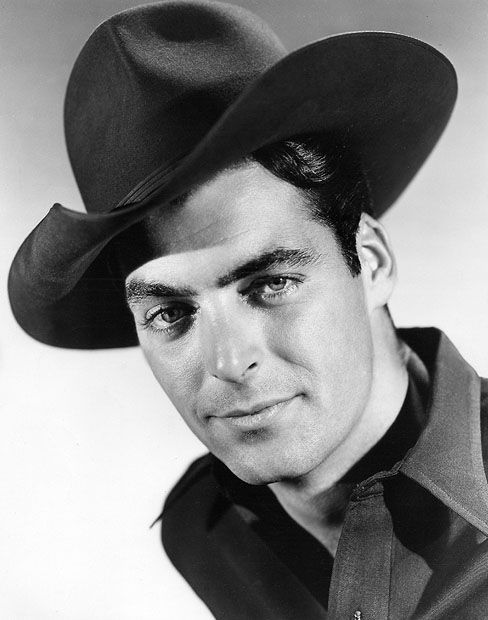"[Heather MacLean, an Olympic 1,500-meter runner] realized her watch was draining the fun from her runs. It was especially apparent to her during a low-key stretch when she was simply trying to build fitness.
I hated that every run I went on, I felt like I had to check my pace and my distance and whatever else,” she said. “So I just decided that I was going to lay off it for a while and switch to a regular watch.”
She never went back. MacLean, 28, who now wears an Armitron Dragonfly that she said she picked up for $10 at Walmart, acknowledged that there were certain workouts when a GPS watch would come in handy, like when she did a tempo run by herself. (Tempo runs are faster than easy jogs, and frequently run at a prescribed pace.) But Mark Coogan, her coach, has long prioritized effort over pace, and MacLean logs her training in minutes rather than in miles.
“I know I’m at the elite level now, so not everything is going to be joyful,” MacLean said. “But when there are things that bring me a lot of joy, I’m going to invest in them. And one of those things is the ability to avoid focusing on my pace during my runs.”
Without the pressure of feeling as if she needs to account for every mile — or, perish the thought, post her workouts for public inspection on Strava, the exercise-tracking platform — MacLean has also gotten better about listening to her body. She has no qualms about bailing on an extra workout if she is feeling beat.
“And I’ll tell Mark that I’m going for a walk instead,” MacLean said. “And he’s like, ‘OK!’”
Whatever they’re experiencing, I have the opposite. It’s the numbers and the data that keeps me interested and focused. It’s learning to align what my body is telling me with what my watch is telling me.
If I lost access to smart watches, I’d probably not stay active
100% same for me. I’m a data geek. I don’t even need to actually be using the data to train by to get enjoyment just out of seeing it there. Seeing my averages change, or my monthly time grow, or just looking at the relationship between pace, cadence, and stride length. That’s part of the fun of it all!
I’m not a runner, but I lift and I’m very goal and data oriented much like yourself. I love to see objective measurements of improvement in what my body is capable of. I love track the sheer tonnage that I pick up off my basement floor then put right back down on my basement floor. I live to look back at my numbers from a year ago and see the difference and I think I really would lose a lot of my motivation if I couldn’t.
Same, I want more and better accuracy. I just ditched an Apple Watch Ultra for a new Garmin unit because it’s just that much better for my needs.
Which one did you choose?
Epix Gen 2 Pro
Absolutely. I just crossed 500mi this year, for the first time. I’m really excited by hitting that mark (I know, not a big deal to most runners), and will be seeing how high I can go without injury by year end.
Same, it was getting a Garmin that got me into tracking steps, fitness etc. I didn’t even run initially. I walked for 18 months first. Slowly progressing to jogging bits of it, then more until eventually I was jogging the whole circuit.
I’m no elite runner. The first kilometer of my circuit has a 130m ascent of staircase up an escarpment. It’s brutal and I love conquering it. But it stifles any hope of breaking time records.
Ever thought about letting that staircase be the stat end? That way you can also squeeze in a rest every circuit if you feel like it.
I’d just … not do it sometimes. I’d justify it with “too tired today” and “Don’t have enough time for Jacob’s Ladder today”. Having it when I’m fresh takes that excuse away.
It’s also kinda on the way out of the CBD and into a big park. It would be sort-of doubling back away from the office. I could make it work, but the beautiful park is like a reward for doing the climb. Having the return to the office be my reward for doing it wouldn’t quite have the same incentive.
Ahh, that makes sense. Whatever works for you.
Back in school our PE teacher would make us run up the staircase and then back down, incrementally increasing the floors we’d have to climb in one go. It was torture, and I remember it bitterly, even though it did loads to improve my general health and breath control.
Anyone else ever just feel like every topic these days has to have pro and con article out there for people to latch onto? I’m sure it’s only getting worse with AI, but there’s so many of these that just seem to exist to be sticks to get people to discuss things.
I guess I’m the guilty party. :) I posted the article because I thought it was thought provoking enough to engender discussion – something I like if it’s civil and mostly intelligent. I didn’t think everyone would agree with the athletes quoted or that they should or shouldn’t.
I feel like most of these could be explained by people who have lost their love and need something to blame.
There’s no way metrics is hampering them.
I can easily think of times I likely should have rested or slowed down but wanted to keep a number high.
For me, metrics are a net positive, but I’ve often done counterproductive things because of them.
Maybe I use my watch differently, but I use my watch to set the pace I should run at, and then it ensures I keep myself there without going too fast!
Yeah that’s definitely it for me. Far more often I look at my watch and realise I’m going too fast for the type of run I want to do, and slow down, than the opposite.
Last year I was running a marathon with a target time that perfectly matched one of the pacers, so I stuck to her. But she was going about 10 seconds per k faster than the target pace for the first two thirds or so. If I hadn’t had my watch to know that, when I eventually couldn’t keep up with her after about 26 k I would have felt utterly defeated. As it was I knew I still had a fair bit of wiggle room, and I ended up coming in just under my target time.
Though the opposite does happen too on occasion. Particularly in those faster tempo runs.
I use pre-programmed pace times for my runs, and my watch complains at me when I go above or below that bracket.
Interesting. I’ve seen the option for that on mine but I’ve never used it. How well does it work? I don’t really even trust mine to tell me my “current” pace, preferring to rely on lap average and automatically lapping each kilometre. Does the pace guide work well?
The other obvious worry is hills. If I’ve got a target pace in training, I usually am not thinking about hills in that, and I’d be happy to slow down while ascending them, and I’m probably not going to quite make up the difference on the downhill. Is that not a problem you’ve run into?
So, I used TrainAsOne, which builds a dynamic plan that adjusts to your fitness levels etc.
And when it generates a workout, it exports that to my Garmin. So then when I run, the Garmin has a pace range, and it shows my average pace for that leg, updated in real time, in a nice little interface. Green when I’m within the pace band, red when I’m not.
Also, given that it only cares about your average pace for the leg, it also takes in to account your previous runs and assumes you will run something similar in terms of gradient. It also adjusts for expected heat levels etc.
It will be wrong if you move to a location with a radically different gradient profile, but even then, once you’ve run it, it will take in to account the actual gradient and your pace, so you don’t get punished for running slower on gradients
On Coros watches, there’s “effort pace.” I think it’s very close to “gradient adjusted pace” on some other watches. Both give a pace number adjusted for the grade one is running up or down. On Coros, one can make workout targets using effort pace that adjust for hills.
Nobody is being hampered, the article was talking about joy.
deleted by creator
That’s in the company of others, most people playing solo keep tabs to see if they’re doing better or worse.
I’m sure many of us could ditch out fitness watches if we had a coach.
Could, but wouldn’t!
Yes. One we trusted. Haven’t had that since I stopped cycle racing. The more I’ve learned and experienced, the harder it is for me to trust a coach.
I have a Garmin. I mainly use it as a time measure. Yeah it has stats and stuff, but it also lets me store some music on it so I don’t need to run with a phone.
Which device do you own? Can you connect your watch to your earphones via bluetooth?
My Garmin Fenix 6 does this. Other models (forerunner, Enduro, etc) are also capable of pairing and streaming music to ear buds.
Here is their website filtering wearables with 'Music Storage’.
Desfit and DC rainmaker YT channels have some great reviews and dives into these products if you need more information. The Garmin website isn’t bad either.
Yeah. Bluetooth connection with forerunner 245 music
I think the biggest problem is strava and the subliminal pressure to impress. I cherish slow runs, in between fast ones, but rarely post anything on strava, only monster workouts if any
I have my Strava set to private. I only make virtual races public.
But I am really only using Strava to collect data and pass that data on.
I’m old and I used to run at a sub elite level. My PBs are all behind me, which if nothing else, frees me from the pressure to impress random Strava users :)
I had that issue with Strava, especially coming back after an injury or hiatus. I just stopped checking the social aspect of it completely and just use it for tracking, though I use Garmin connect more for that now though.
And that’s what everyone else does as well, thus warping everyone’s perceptions and basically creating the same “Instagram life” issues but with sports, where you compare your worst to other’s bests.
It always blows my mind that people just can’t tell themselves no. Notice you’re looking at your Watch for every little thing and don’t like it? Then train yourself to not do it. Jesus.
Some people are wired differently, ain’t no thing
I understand your point. I just believe that self-discipline is a skill that can be worked on no matter who you are or what kind of brain you have.
Yes, people can work on it, if they want to put effort in on that. Some times all they have energy for is the interval they are in. Some people can resist temptation, some people are addicted. We aren’t all given the same ability.
Isn’t that exactly what they’re doing by ditching the watch?
Not all of us are working with the same mental hardware, either.
I understand your point. I just believe that self-discipline is a skill that can be worked on no matter who you are or what kind of brain you have.
I set my Garmin to show just my heart rate for direct feedback on my effort. I can nerd over my other stats after the run/ride/whatever.
I am not without self discipline. Nonetheless, when I am tired/hot/hungry/etc., as it often is when running, my willpower is at its weakest point. :)
Am far from her athletic level, of course, but I ditched my Garmin Forerunner 220 for the exact same reason when I was in my peak condition. It’s a great watch to help you get to and maintain healthy cadence, but once that becomes ingrained in your running style focusing on data i simply too much. These days this overpriced piece of plastic just sits on a shelf somewhere.
I was thinking about that during my run yesterday. It was on my wrist but I didn’t really look at it because now I know what feelings to look for. It’s been very very useful as a beginner though when I was always running too fast.
It still has a use for me because I like setting up adventures. Pick points of interests on a map, set them as compass waypoints and try to find it while running.
I have a dozen cheap watches and one smart watch. I only wear the smart watch for dress up events.
I get how people are motivated counting steps and what not, that’s perfectly valid. Power to ya! But my body and mind know if I’ve moved enough for the day, or failed to do so.
I’m outside and moving, a lot. At first it was neat to have a watch telling me what I had done, not so much anymore. And how valid is the data? There’s a hella difference walking around the office/downtown, kayaking a swamp and hiking smooth/rough trails.
Gf and I are sporting $20 1980’s Seikos. Much love! I also have 3 Swatches from back in the day. Point being, go with what works for you. Hell, I’m told I’m ancient for even wearing a watch. (Are they in fashion again?)
But my body and mind know if I’ve moved enough for the day, or failed to do so.
I wonder how much of it comes down to that. I never know when my body has had enough until after the fact. I’ve ran myself in to a stress fracture without even realising that I’m hurt, because it’s so hard for me to hear what my body has to say.
As the Born To Run guy says, mind and body don’t speak the same languages! Often true for me. I too, have run myself into stress fractures while certain I was listening to my body.
I was like that when I was younger, beat myself to death. Now that I’m 52 I have a great physical “clock”, I can feel it.
Lets just say, I have 4 years to develop that ability then :)
anyone got a archive copy, or gift pass to see it?
Edit, thanks I came here from elsewhere, reading now. my bad
– its an interesting perspective. I don’t have a coach who can check splits or plan my runs by time. I could plot and guess, and I’m sure I’d do well, might be interesting to see if I can produce results w/out a watch, but I do like it. Like earbuds / music u do you.
well, funny as I just got myself a smartwatch to help motivate myself and track myself.
For anyone privacy conscious I can recommend Gadgetbridge and the Amazfit Smartwatches btw, like 99% of features work, and the watch (or app) cannot send anything to a third party without you doing it manually.
It’s weird, when I’m on trail I don’t care much about pace or whatever, but when I’m on the road it’s like my watch is always there judging me.
deleted by creator
Well, the article consists of interviews with some elite runners . . . so, I understood what they meant.
Not using any kind of data made me a better cyclist imo. At my peak this year I rode 80km daily on average and pretty fast. Keep in mind that I was overweight at that point, started out obese this year and that I’ve never been fit in my entire life. If you only listen to your body your body will take you close to its limits. The first time I felt that my mind wasn’t capable of keeping up with what my body wanted to do was on my first 120km ride.
Currently I’m more focused on running and I’m still figuring some stuff out. I think I just got my diet right.
But I’m starting to look for fitness trackers now as I think that I’m getting to the point where I’ll run into a barrier without tracking my performance in the foreseeable future.
If you want to stick with cycling, I strongly suggest just getting OsmAnd maps and enabling cycling profile. You can configure map to show all kinds of useful things and have the phone turn off display while riding. It can record your route and other useful metrics but you can avoid having it displayed non-stop.
Thanks but I kinda want to stay ignorant about my cycling. I have a shitty mountainbike I bought for 130€ and due to rigorous training I’m about as fast as a casual rider on an expensive race bike. I don’t want to be the fastest, I want to annoy middle aged middle manager type guys who spent a lot of money on equipment by riding their pace. So cycling is more about philosophy and trolling for me.
Okay. Enjoy it then. :)
80km IRL or on a … dam I forgot the word. Stationary cycle? Exercycle.
IRL, on a mountainbike but mostly on flats.











